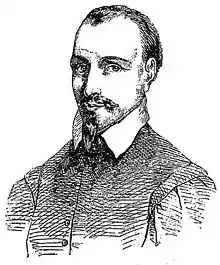Olivier de Serres
Olivier de Serres (French pronunciation: [ɔlivje də sɛʁ]; 1539–1619) was a French author and soil scientist whose Théâtre d'Agriculture (1600) was the accepted textbook of French agriculture in the 17th century.[1]
Olivier de Serres | |
|---|---|
 | |
| Born | 1539 |
| Died | 1619 (aged 79–80) |
| Nationality | French |
| Occupation(s) | author, soil scientist |
| Known for | accepted textbook of French agriculture in the 17th century |
| Notable work | Théâtre d'Agriculture (book) |
| Relatives | Jean de Serres (brother) |
Biography
Serres was born in 1539 at Villeneuve-de-Berg, Ardèche. His brother, Jean de Serres, was a well-known French humanist and translated the complete works of Plato.
His book was notable for recommending winegrowers to plant 5 to 6 varieties in their vineyards to balance the risk of a crop failing, an early advocacy of crop rotation.
It also recommended métayage (sharecropping) so that cash tenants would take all the risks and thus demand lower rent, as hired labour is expensive to manage. Sharecroppers administer themselves and risks are divided with the landlord. According to him, only large landowners should take the risk of hiring labourers and running the estate themselves.[2]
Notes
- Hugh Johnson, Vintage: The Story of Wine pg 122. Simon and Schuster 1989
- The Economic Theory of Sharecropping in Early Modern France, Philip Hoffman, The Journal of Economic History 1984, page 312
